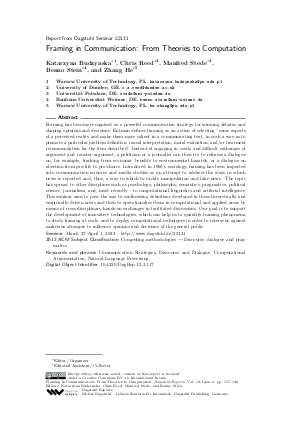Framing in Communication: From Theories to Computation (Dagstuhl Seminar 22131)
Authors Katarzyna Budzynska, Chris Reed, Manfred Stede, Benno Stein, Zhang He and all authors of the abstracts in this report
-
Part of:
Issue:
Dagstuhl Reports, Volume 12, Issue 3
Part of: Volume: Dagstuhl Reports, Volume 12
Part of: Journal: Dagstuhl Reports (DagRep) - License:
 Creative Commons Attribution 4.0 International license
Creative Commons Attribution 4.0 International license
- Publication Date: 2022-11-14
File

PDF
DagRep.12.3.117.pdf
- Filesize: 3.67 MB
- 24 pages
Document Identifiers
Subject Classification
ACM Subject Classification
- Computing methodologies → Discourse, dialogue and pragmatics
Keywords
- Communication Strategies
- Discourse and Dialogue
- Computational Argumentation
- Natural Language Processing
Metrics
- Access Statistics
-
Total Accesses (updated on a weekly basis)
0Document
0Metadata
Abstract
Framing has become recognised as a powerful communication strategy for winning debates and shaping opinions and decisions. Entman defines framing as an action of selecting "some aspects of a perceived reality and make them more salient in a communicating text, in such a way as to promote a particular problem definition, causal interpretation, moral evaluation, and/or treatment recommendation for the item described". Instead of engaging in costly and difficult exchanges of argument and counter-argument, a politician or a journalist can then try to reframe a dialogue on, for example, fracking from economic benefits to environmental hazards, or a dialogue on abortion from pro-life to pro-choice. Introduced in 1960’s sociology, framing has been imported into communication sciences and media studies as an attempt to address the ways in which news is reported and, thus, a way in which to tackle manipulation and fake news. The topic has spread to other disciplines such as psychology, philosophy, semantics, pragmatics, political science, journalism, and, most recently – to computational linguistics and artificial intelligence. This seminar aims to pave the way to synthesising definitions developed in these theoretically and empirically driven areas and then to operationalise them in computational and applied areas by means of cross-disciplinary hands-on exchanges in facilitated discussions. Our goal is to support the development of innovative technologies, which can help us to quantify framing phenomena, to study framing at scale, and to deploy computational techniques in order to intervene against malicious attempts to influence opinions and decisions of the general public.
Cite As Get BibTex
Katarzyna Budzynska, Chris Reed, Manfred Stede, Benno Stein, and Zhang He. Framing in Communication: From Theories to Computation (Dagstuhl Seminar 22131). In Dagstuhl Reports, Volume 12, Issue 3, pp. 117-140, Schloss Dagstuhl – Leibniz-Zentrum für Informatik (2022)
https://doi.org/10.4230/DagRep.12.3.117
BibTex
@Article{budzynska_et_al:DagRep.12.3.117,
author = {Budzynska, Katarzyna and Reed, Chris and Stede, Manfred and Stein, Benno and He, Zhang},
title = {{Framing in Communication: From Theories to Computation (Dagstuhl Seminar 22131)}},
pages = {117--140},
journal = {Dagstuhl Reports},
ISSN = {2192-5283},
year = {2022},
volume = {12},
number = {3},
editor = {Budzynska, Katarzyna and Reed, Chris and Stede, Manfred and Stein, Benno and He, Zhang},
publisher = {Schloss Dagstuhl -- Leibniz-Zentrum f{\"u}r Informatik},
address = {Dagstuhl, Germany},
URL = {https://drops.dagstuhl.de/entities/document/10.4230/DagRep.12.3.117},
URN = {urn:nbn:de:0030-drops-172713},
doi = {10.4230/DagRep.12.3.117},
annote = {Keywords: Communication Strategies, Discourse and Dialogue, Computational Argumentation, Natural Language Processing}
}
